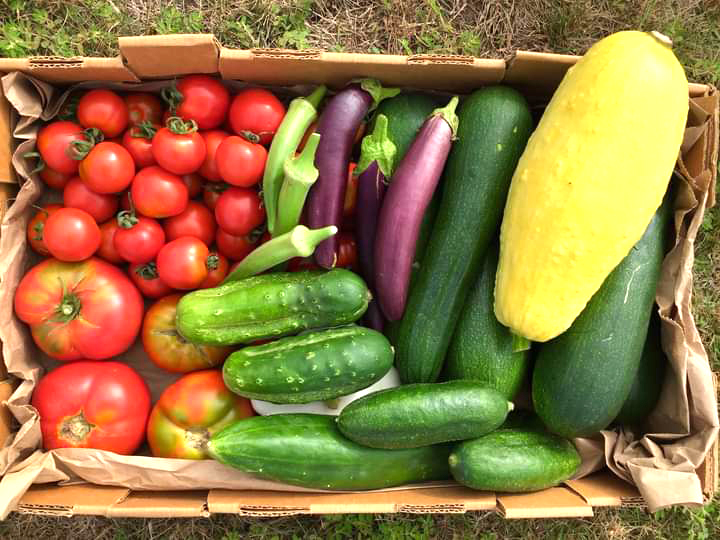For decades, home gardeners have been preparing the food from their garden to either store in their cupboard or share with friends.
Liz Rae and Susan George, organizers of Oceanside Crop Swap, have taken on the yeowoman’s job of organizing two monthly crop exchanges at their Oceanside locations.
Twice each month the group gathers, sometimes with over 30 fellow gardeners, to exchange overflow vegetables, fruit and recipes from their home gardens. The only criteria for the exchange is that all items must be homemade or homegrown and no cash is exchanged.
In a time and place where shoppers can find hundreds of varieties of specialty pickles, jams and jellies in health food stores, there is still the satisfaction of putting up food in one’s own kitchen.
Recently, Liz introduced the group to food preservation techniques and shared her favorite pickle recipe with me.
BREAD & BUTTER PICKLES
From Liz Rae
This easy recipe shows you how to make a half gallon jar of refrigerator pickles that will last for weeks in your refrigerator. There is no need to process with traditional canning methods.
INGREDIENTS
6 c. Cucumbers, sliced (Use Kirby cukes or Persian)
2 c. Sweet onions, slice into rounds
¾ c. granulated sugar
¼. Brown sugar
1 c. each white and cider vinegar
1 tsp. kosher salt
1 Tb. Each mustard seed, celery seed and ground Turmeric
1. Wash and dry one half-gallon Mason jar. Be certain it has been sterilized in hot water.
2. Layer slices of cucumbers and onion in jar.
3. On stovetop heat sugar, vinegar and spices until sugar is dissolved.
4. Pour over cucumbers and onions.
5. This mixture should cover the vegetables. If not, add more cider vinegar.
6. Let the jar cool completely on the countertop. After cooled place lid on jar and refrigerate.
7. Shake jar every few days to incorporate spices.
8. Pickles are ready in one week and can be stored for one month.
During the pandemic I interviewed the Cornell University Cooperative Extension Agriculture Director, David Cox, and he said, “ People are beginning to learn that our food may not, in the future, be readily available at the local big box store.
Here in Upstate New York, farmers have been canning and freezing their homegrown produce their entire lives, and it will become useful for the average home cook to learn how to grow their own food and put food by.”
“Today we don’t have to preserve foods at home because of the variety of commercially available products, but making homemade pickles, like anything you cook yourself, gives you total control of what you eat,” remarked Lucy Norris in her comprehensive food preservation book, “Pickled.” This book, along with others such as the “Blue Book of Canning,” can help lead a novice canner on their way to success.
Food preservation classes are also offered online from Penn State Cooperative Extension and Cornell Cooperative Extension.
Liz Rae is one of a handful of local gardeners who are sharing their love of vegetable gardening and passing it onto others.
To learn more about the Oceanside Crop Swap, visit their Facebook page or contact me for further information.
Jano Nightingale is a horticulturist and Master Gardener and teaches gardening classes in North County. For information regarding her courses, contact her at [email protected].



